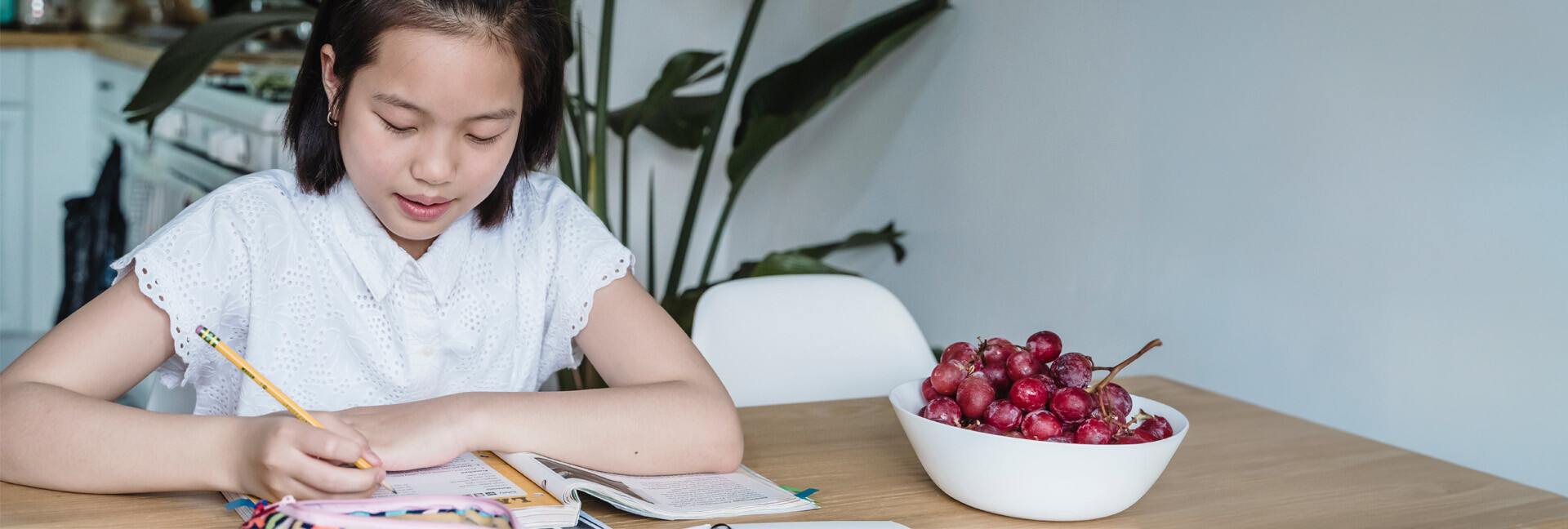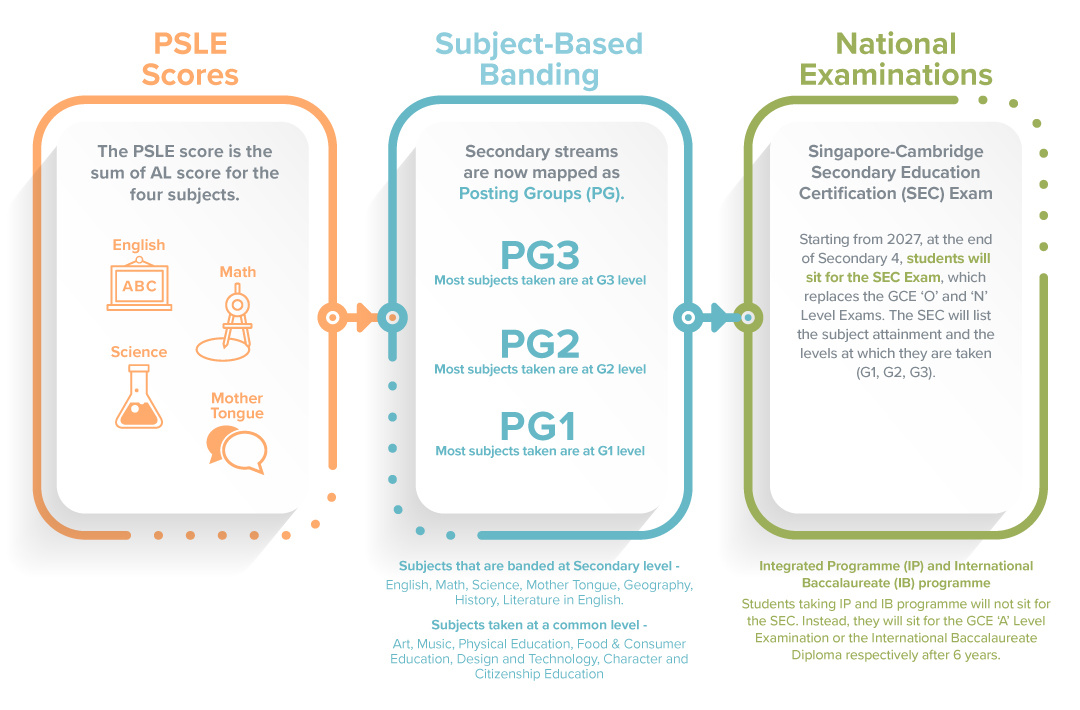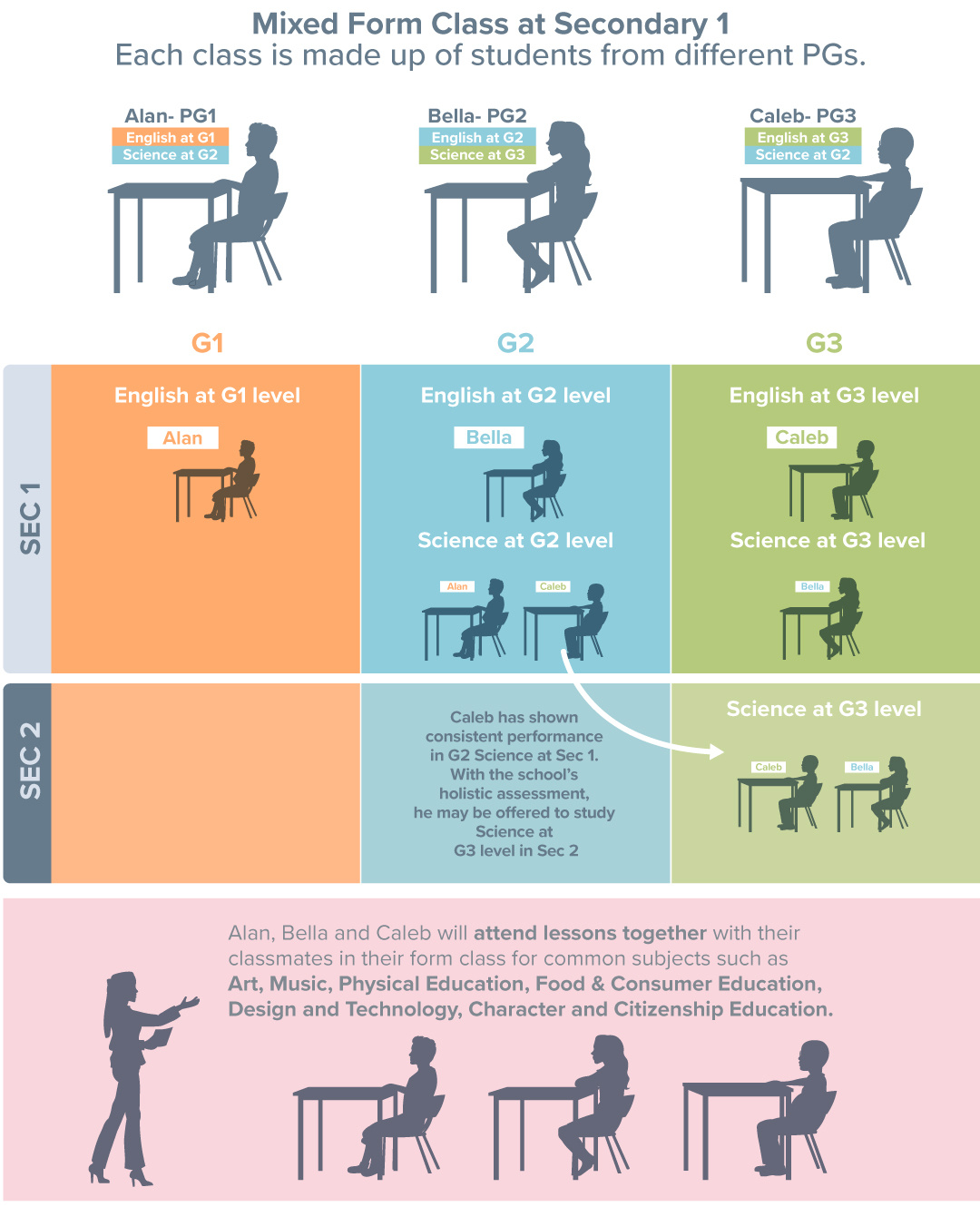
The Ministry of Education has announced a slew of changes for incoming secondary school students in 2024. These changes include Full Subject-Based Banding (Full SBB/FSBB) for these students. In this article, we will explore how these changes might affect your child and offer tips on how you can prepare them effectively.
What is Full Subject-Based Banding and
How Will It Affect Your Child?

Full Subject-Based Banding (FSBB) allows your child to study secondary school subjects at varying General (G) levels – G1, G2 and G3, mapped from existing Normal (Technical), Normal (Academic) and Express standards. Upon receiving their PSLE results, your child will be informed of their Posting Group (PG), which will be used to guide his or her choice of schools.
Your child’s subject banding will then be determined based on their PSLE Achievement Level (AL) scores for each subject. If eligible, he or she may be offered to study English, Mother Tongue Languages, Mathematics and Science at a more demanding level in Secondary 1, and the Humanities at a more demanding level in Secondary 2.

The move towards FSBB allows students to pursue their strengths and interests in specific subjects, resulting in a diverse portfolio of subjects taken at the new Singapore-Cambridge Secondary Education Certificate (SEC) examination.

With FSBB, your child is empowered to progress at their own pace. If your child begins the subject at G2 level and consistently performs well, coupled with their interest, readiness, and the school’s holistic assessment, he or she may be offered to take the subject at a more demanding G3 level.
This approach encourages a growth mindset, which aligns with TLL's Knowledge, Skills and Disposition (KSD) model. In this model, students not only acquire the knowledge and skills to achieve academic success, but also develop a positive mindset so that they will grow in confidence to overcome challenges and achieve their goals.
How Does Full Subject-Based Banding
Compare to Streaming?

Under the previous streaming system, students were sorted into three fixed academic tracks – Express, Normal (Academic), and Normal (Technical) – based on their PSLE results.
At first, streaming was intended to cater to students’ varying academic needs and abilities, allowing them to learn at different paces. However, over time, downsides of streaming emerged including:
- Stigma: Students in some streams were perceived to be ‘less smart’ or of a lesser status, affecting their self-esteem and confidence.
- Lack of flexibility in choosing subjects: Students had to stick to the subjects in their stream throughout secondary school, even if they had the potential to succeed in a more difficult class, or if they could have benefited from a slower pace of learning. Some subjects were also not made available to students in certain streams, even if they had the interest or capability to excel in them.
- Rigidity in secondary school journey: Because streaming was determined by PSLE results, it did not take into account students who were ‘late bloomers’ who only realised their academic potential in their secondary school years.
Full Subject-Based Banding aims to address the weaknesses of the previous streaming system by emphasising greater flexibility and customisation in students’ learning journeys. Instead of their subjects being determined by PSLE results alone, students can pursue subjects based on their interests and ability levels.
Students can also move between subject levels if required or desired, encouraging them to continue with their favoured subjects. Likewise, being in form classes with students of different ability levels will help minimise stigmatisation, allowing students to appreciate their classmates’ diverse abilities and talents.
What are the Benefits of Full Subject-Based Banding?

A Greater Range of Subjects
In addition to English, Mathematics, Science, and Mother Tongue, students will be able to opt for certain subjects after Secondary One if they meet prerequisite criteria. For example, students who show interest and aptitude in the Humanities in Secondary One will be able to take up the Humanities (Geography, History and/or Literature in English) at a higher level in Secondary Two.
Certain schools will also be able to offer subjects such as Additional Mathematics, Art, and Design & Technology based on their capacity as well as students’ learning needs.

More Opportunities to Pursue Interests
Your child will be able to pursue their chosen subjects at a more demanding level, allowing them to learn more deeply according to their strengths and interests. By allowing students to pursue subjects that excite them, FSBB also encourages students to dive deep into their interests and pursue passion-based expertise rather than pure academic merit.
This change encourages an organic love of learning, empowering students to pursue their passions alongside and as part of their academic strengths.

Exposure to Diverse Learning Experiences
With the option to choose subject levels (G1, G2, G3), your child can explore a diverse combination of subjects in secondary school. This allows your child to pursue subjects at different intensities that suit their interests, learning needs, and goals.
3 Ways You Can Support Your Child
1. Build a Good Support System
It is essential to provide a strong support system to help your child navigate through the changes that come with a new school environment, learning styles and curricula.
You can start by instilling a growth mindset in your child and creating a community of knowledge and support with fellow parents on the same journey. Engage with education professionals and stay updated through education forums. This helps you gather valuable advice and recognise when your child needs help.
Seek out an education partner that not only imparts academic knowledge and skills but also emphasises fostering can-do attitudes. This comprehensive approach ensures that your child is well-equipped to navigate any academic challenge and achieve their best in all endeavours.
2. Take a Forward-Looking Approach
Strengths and weaknesses are not necessarily conflicting. If your child excels in certain subjects and struggles in others, view this as an opportunity to identify their academic strength in specific subjects.
Approach weaker subjects with an improvement-oriented mindset. Having this shift in mentality helps your child to recognise that people have different strengths and learning needs in both school and in life.
This becomes an excellent starting point for conversations to encourage self-reflection and self-awareness. You can engage your child in such discussions by asking questions like:
- “I see that [topic in Maths] can be challenging for you. Can you tell me more?”
- “Wow, your teacher says how much you are enjoying writing English essays. Tell me more about that!”
- “It’s okay to struggle with something; it’s part of the learning process and how we grow. What do you think you can do to improve your understanding and make it less stressful for you?
Developing self-reflection and self-awareness is key to unlocking your child’s ability to independently identify areas for improvement. At TLL, we nurture these habits by emphasising understanding one’s own mistakes through analysing errors.
This approach encourages them to take responsibility for understanding why your child may have answered a question incorrectly and reinforces the idea that grades are not the sole outcome of learning.
3. Co-Pilot with Your Child
As your child becomes more independent in secondary school, it is important to shift from being the sole driver of their education to a co-pilot. Create a safe space where they can freely voice their thoughts, concerns, triumphs, and setbacks to you.
This empowers them to provide valuable insights and learn to make informed decisions about their education, such as their choice of school and subjects they envision pursuing at a higher level in the future.
Maintaining such open, honest, and accountable communication will help ensure that your child feels heard and supported throughout their educational journey.
Building confident self-expression is a skill that can be learned, honed, and applied in TLL. In our lessons, we motivate students to express their thoughts, ask thoughtful follow-up questions and engage in class discussions with their peers and teachers.
In addition to building confidence, this also allows your child to consider various perspectives, evaluate them against their own and adjust when necessary. With these skills, your child will grow into someone confident in charting their own path ahead.
Have a Question? Let's Chat.
Still have questions about how Full Subject-Based Banding will affect your child’s schooling? Or is your child making the transition from Primary 6 to Secondary 1 soon and having difficulty adjusting? Here at The Learning Lab, our teachers are here to help. Be it Primary 6 tuition or Secondary 1 tuition, our classes are designed with FSBB in mind to help ease your child’s journey through PSLE, Secondary 1 posting, and beyond.
Find and visit your nearest centre here to find out how we can help your child succeed in their academic goals.
If you have any questions about our range of programmes or class schedules, you may fill in the form below or contact us at 67338711 or at enquiry@thelearninglab.com.sg
